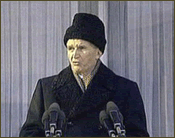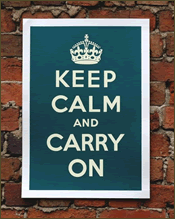Health Care Conundrum
 An esteemed colleague of mine challenged the blogging community to explain American healthcare and the need for its reform. This was intended, I believe, partially as a plea for more substantive online discourse given the tidal wave of frippery that has been generated recently, such as the disproportionate response to the death of Michael Jackson and the jingoistic sabre rattling some demand as a reaction to events in Iran.
An esteemed colleague of mine challenged the blogging community to explain American healthcare and the need for its reform. This was intended, I believe, partially as a plea for more substantive online discourse given the tidal wave of frippery that has been generated recently, such as the disproportionate response to the death of Michael Jackson and the jingoistic sabre rattling some demand as a reaction to events in Iran.
The problem with trying to explain the American healthcare system is two-fold. First, it’s complex. I can describe in less than 5 minutes how the British system basically works: namely, one registers with a local General Practitioner, who then acts as the gatekeeper to further treatment. Prescriptions under certain circumstances (e.g., if you’re unemployed) are free, and in other cases, they are paid for with a modest fee. The system has waiting lists and is behind on the availability of drugs and medical technology: it’s not perfect. However, private insurance and private hospitals are also available and these supplement the system. Private medical insurance tends to be provided by one’s employer.
Similarly, I can readily explain how the social health insurance systems in the Netherlands, Belgium and Germany function; I’ve personally used the Dutch system and found it to be the best of the lot. The waiting times were minimal and the medical facilities were top notch. However, I can’t as easily discuss how the American system works. I recall visiting America last December and being utterly baffled by some of the commercials which mentioned Medicare Part D. I wondered what Parts A, B and C were all about. Indeed, there were private firms which offered their services to handle the interactions with the necessary agencies. I asked my mother, herself a pensioner, to explain Medicare Part D and she struggled to do so.
Beyond expensive government schemes, there are private health insurance plans which are almost Byzantine in their complexity and akin to Medieval Venetian politics in their viciousness; for example, there is a word called “rescission” which should make every American with health insurance tremble in fear. “Rescission” refers to a process whereby insurers cut off clients from funds due to their supplying insufficient information about their present medical condition. On the surface, this sounds like a reasonable means of preventing fraud. In practice, there are cases such as a woman who was denied money to treat her breast cancer due to failing to report a visit to a dermatologist.
This mindless, sadistic bureaucratism and convolution perhaps highlights a major flaw in America’s health care: a system which is difficult for the typical citizen to comprehend or navigate is unlikely to work well. The patient is not going to understand the parameters, and firms will exploit this lack of understanding.
The second part of the problem follows the first: because of the system’s sheer density, analysis of American health care is extremely difficult and indeed, boring. Only very few people have sufficient intestinal fortitude to absorb the sheer amount of tedium associated with creating a reform plan. I recall the cold, analytical Ira Magaziner as being one of these select boffins; he was portrayed in an issue of the Economist published during the Clinton Administration as having a disk drive in his head, in which he plugged one disk after another. He managed to produce a proposal that was just as complex as his analysis: it became a many headed hydra in the eyes of the public, and subsequently died.
However, there is no doubt that the system requires reform, not just tinkering at the edges. America spends nearly twice the average proportion of its GDP of any developed nation on health care. Yet the outcomes are grossly unequal and shoddy: the contrast between the public penury of inner city clinics and the gleaming pristine temples of science which represent the outposts of the Humana corporation could not be more stark. Indeed, last week’s issue of the Economist magazine outlined some more of the system’s dire outcomes:
…infant mortality, life expectancy and survival-rates for heart attacks are all worse than the OECD average. Meanwhile, because health insurance is so expensive, nearly 50m Americans, an obscene number in such a rich place, have none…Every rich country faces some of these problems, but nobody suffers worse from them than America.
In other words, a nation that prides itself on getting good deals and having business savvy has “bought” a health care system that isn’t value for money. Yet, it is also the third rail of politics in many respects: everyone says something should be done, but when it comes down to actually doing something, citizens and politicians balk at the detail. This is understandable to a certain degree: health care, after all, is literally a matter of life and death.
Given this situation, President Obama somehow has to foist reform on an extremely reluctant Congress: here is where America’s system of government lets it down. Checks and balances prevent any one branch of government from becoming too powerful, yet at the same time, these constraints make dramatic alterations in the status quo all the more difficult. Worse, lobbyists from the pharmaceutical firms and other interested parties will put pressure on Congressmen to vote their way; let’s assume that Representatives are people too, and thus are susceptible to receiving campaign cash in order to remain in office for another 2 years with all the perks that implies.
However, even if the insurance companies and health care providers are forced into making dramatic changes, there are three additional areas of cost control which will be necessary to address. First, most new doctors emerge from medical school heavily in debt. The average debt for medical students upon graduation is $139,517, according to 2007 figures provided by the American Medical Association. In order to recompense the graduates’ expenditure, hospitals and practitioners have to ensure that sufficient salaries are paid. This requirement makes its way into medical costs. Thus, the President and his allies are also going to have to work with the education establishment to achieve cost control in medical schools.
Second, pharmaceutical firms will continue to insist that the costs of research and development will eat into their profit margins, and thus high drug prices are justified. This problem can be ameliorated if the relationship between private industry and academia is more formalised in America as it is in Britain; the British Government, in one of its more foresighted moments, has put emphasis on what it calls “Knowledge Transfer”, i.e., getting knowledge out of the realms of pure research and academia and into the hands of firms which can exploit it for society’s benefit. The links implied and fostered by this policy do not presently exist in the United States; if these were put in place, the costs associated with research and development of new drugs could be more evenly distributed.
The final item that needs to be addressed is tort reform. According to a 2003 article in Business Wire, New Jersey hospitals experienced a jump in malpractice insurance costs of 207% in four years, making the average cost at that time approximately $1.4 million per hospital. These costs also feed through into higher prices; this will mean that the present American addiction to suing anyone and everyone for the slightest breath of malfeasance is going to have to end. In order to achieve this, President Obama is going to have to turn on one of his major constituencies: lawyers. Following this, he will have to go back to the insurance companies and say that their prices for malpractice insurance are now out of date and should be lowered. This assumes, of course, he does not change course and attempt to put in place a single payer system as is utilised in Canada, Australia and Taiwan. At a stroke, the entire relationship between the providers of health care and its customers would be changed, and likely make the other elements of reform that much easier to put in place.
He probably should look at such a scheme, or the forms of social insurance as used in Europe: his present well-intentioned approach is in danger of being diluted by Congress, and the various interest groups which tug upon it, into something as diffuse and complex as the present system. In short, one mess is on course to be traded for another. Above all else, President Obama should be aiming for the clarity and simplicity which are part and parcel of nearly every other health system in the industrialised world; people should have a focused understanding of procedures, costs, and what to expect. That said, no system is perfect, but perfect should not be allowed to be the enemy of better.

 Dictatorships are a waste of everyone’s time. There is no instance in which one has been imposed and it did not prove self-defeating in the end. Hitler thought he was building a Reich to last a thousand years; it lasted twelve. Germany afterward was a devastated country which was chopped into two and has lived under a cloud of mild suspicion ever since.
Dictatorships are a waste of everyone’s time. There is no instance in which one has been imposed and it did not prove self-defeating in the end. Hitler thought he was building a Reich to last a thousand years; it lasted twelve. Germany afterward was a devastated country which was chopped into two and has lived under a cloud of mild suspicion ever since. As much as I would have liked to remain on vacation, it’s impossible to escape current events in this day and age. Switch off the television, and news pursues one onto the radio. Turn off the radio, and there’s the internet. Unplug the computer, and there are the news stands. And then, even if one isolates oneself in a country cottage in, say, the middle of Wales, the phone rings and someone says, “Did you hear…?”
As much as I would have liked to remain on vacation, it’s impossible to escape current events in this day and age. Switch off the television, and news pursues one onto the radio. Turn off the radio, and there’s the internet. Unplug the computer, and there are the news stands. And then, even if one isolates oneself in a country cottage in, say, the middle of Wales, the phone rings and someone says, “Did you hear…?” This will be my last post for an extended period, as I intend to go “on vacation” from my blog for a time. The reasons are personal; however, I will not be actually evacuating the scene, rather, I will be concentrating on my reading and my studies. If my motivation levels go higher, I will do some of this down at Brighton pier, or find time to go to the Isle of Wight to cast stones into grey waters of the English Channel.
This will be my last post for an extended period, as I intend to go “on vacation” from my blog for a time. The reasons are personal; however, I will not be actually evacuating the scene, rather, I will be concentrating on my reading and my studies. If my motivation levels go higher, I will do some of this down at Brighton pier, or find time to go to the Isle of Wight to cast stones into grey waters of the English Channel. I recently purchased a new mobile phone; generally speaking, I’m not one of those people who needs to replace his handset more often than he replaces his socks. However, I managed to save a fair amount of money on my monthly bill in the process and thanks to its wi-fi connectivity, now I am never far away from the internet, which is a state that warms the cockles of my heart.
I recently purchased a new mobile phone; generally speaking, I’m not one of those people who needs to replace his handset more often than he replaces his socks. However, I managed to save a fair amount of money on my monthly bill in the process and thanks to its wi-fi connectivity, now I am never far away from the internet, which is a state that warms the cockles of my heart. As a supporter of the Green Party, the results of the Local and European elections have rather been like receiving the same birthday present for the second year running, with the exception of getting a nicer card to go with it; it’s an indication that one is more well regarded, but the overall utility of what one receives hasn’t altered. Caroline Lucas and Jean Lambert have been returned to their posts. Brighton and Oxford are apparently daubed in shades of the brightest Green. The wider European result is also reasonably positive: there are now 50 Green MEPs, 9 more than last time. This is good, but it isn’t having Rupert Read in Brussels, nor is it, regrettably, the triumph that would have accompanied the Green Party defeating the BNP in the North West region.
As a supporter of the Green Party, the results of the Local and European elections have rather been like receiving the same birthday present for the second year running, with the exception of getting a nicer card to go with it; it’s an indication that one is more well regarded, but the overall utility of what one receives hasn’t altered. Caroline Lucas and Jean Lambert have been returned to their posts. Brighton and Oxford are apparently daubed in shades of the brightest Green. The wider European result is also reasonably positive: there are now 50 Green MEPs, 9 more than last time. This is good, but it isn’t having Rupert Read in Brussels, nor is it, regrettably, the triumph that would have accompanied the Green Party defeating the BNP in the North West region. All three definitions are congruous with my university’s appearance and demeanour at the moment. Yesterday, amid the bright, late Spring sunshine, I walked between campuses along a woodland pathway; not so long ago, the bare trees were unable to filter out the grey, dim light of a winter sky. Now there were green leaves to act as a filter to the hot sun, and the scent of honeysuckle and the sounds of insects buzzing filled the air. Verdant.
All three definitions are congruous with my university’s appearance and demeanour at the moment. Yesterday, amid the bright, late Spring sunshine, I walked between campuses along a woodland pathway; not so long ago, the bare trees were unable to filter out the grey, dim light of a winter sky. Now there were green leaves to act as a filter to the hot sun, and the scent of honeysuckle and the sounds of insects buzzing filled the air. Verdant. Labour’s listing ship of state continues to suck up the attention of the British media. It’s rather peculiar; after talk of duck houses and digging out moats, one might think that there can’t be much further to go. Anything else should be superfluous, if not dull. Yet, it’s usually at this brink of tedium that another unforeseen outrage explodes across the front pages of the newspapers. Today,
Labour’s listing ship of state continues to suck up the attention of the British media. It’s rather peculiar; after talk of duck houses and digging out moats, one might think that there can’t be much further to go. Anything else should be superfluous, if not dull. Yet, it’s usually at this brink of tedium that another unforeseen outrage explodes across the front pages of the newspapers. Today,  It’s atypical to write a review of a play after it closes: perhaps such an item bears closer resemblance to an epitaph. However, it’s impossible for me to let a production of Cyrano de Bergerac to pass unnoticed.
It’s atypical to write a review of a play after it closes: perhaps such an item bears closer resemblance to an epitaph. However, it’s impossible for me to let a production of Cyrano de Bergerac to pass unnoticed. I heard on radio this morning that today, May 29, is the anniversary of the birth and accession to the throne of Charles II, King of England, Scotland and Ireland between 1660 and 1685. In this instance, the mention was just a preface to playing a piece of music from the period; however, I had to smile. As a writer and an amateur historian, I have a rather special relationship with this king. Also, while I am generally no big fan of royalty or the institution of monarchy, I do have reasons to have sympathy for Charles.
I heard on radio this morning that today, May 29, is the anniversary of the birth and accession to the throne of Charles II, King of England, Scotland and Ireland between 1660 and 1685. In this instance, the mention was just a preface to playing a piece of music from the period; however, I had to smile. As a writer and an amateur historian, I have a rather special relationship with this king. Also, while I am generally no big fan of royalty or the institution of monarchy, I do have reasons to have sympathy for Charles. I'm a Doctor of both Creative Writing and Manufacturing and Mechanical Engineering, a novelist, a technologist, and still an amateur in much else.
I'm a Doctor of both Creative Writing and Manufacturing and Mechanical Engineering, a novelist, a technologist, and still an amateur in much else.




